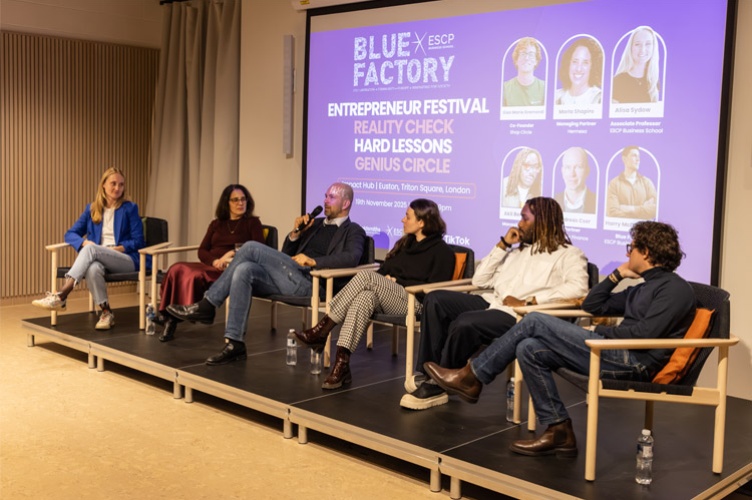ESCP Blue Factory London hosts 2025 Jean-Baptiste Say Entrepreneurship Festival
No one said building a company would be an easy feat.
Every founder knows that hard work often comes with hard lessons, and learning fast often makes the difference between success and failure.
On Wednesday, 19 November, ESCP London Campus hosted its UK edition of the 2025 Jean-Baptiste Say Entrepreneurship Festival – Reality Check at Impact Hub in central London. The event was part of a multi-campus initiative led by the Blue Factory, running across five ESCP campuses to spotlight the real challenges behind launching and scaling ventures.
The event is named in honour of one of the founders of ESCP Business School and the person who coined the term entrepreneur.
Recently, ESCP London Campus and the Blue Factory have been working closely with Camden Council and local businesses to connect ESCP’s entrepreneurial talent with the UK startup ecosystem, while supporting local business growth and international innovation. As a result, the event was open to both the ESCP community, as well as the general public, local founders, investors, and business leaders, welcoming over 100 guests in total.
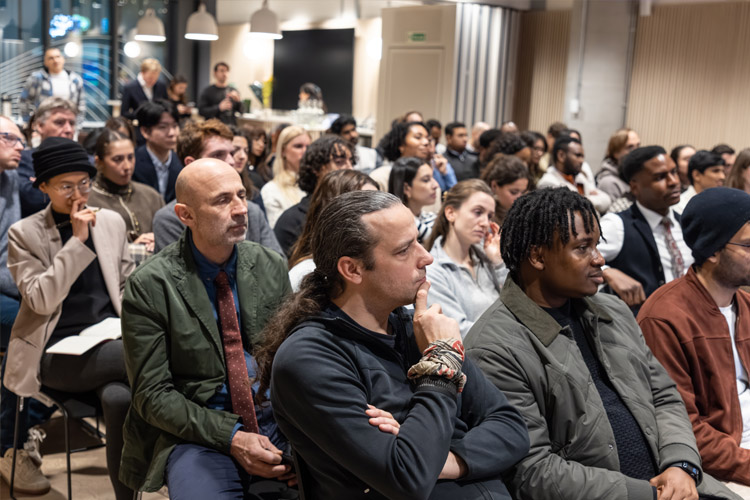
Reality Check: Hard Lessons Panel Discussion
London’s interpretation of “Reality Check” came in the form of an honest panel discussion featuring ESCP alumni and external partners. They reflected on their entrepreneurial journeys, the current market landscape, and the skills needed to succeed, openly sharing the highs, the lows, and the discovered truths about growth.
To capture the essence of the conversation, we summarised the panel’s insights into 10 key lessons that clearly emerged from personal stories shared by the speakers:
1. Take time to reflect on what you're cut out to do
Imagine you have launched and scaled your business, and suddenly you are the big boss managing a large team. Your role has shifted, and it may no longer play to your strengths or bring you the same energy. At every step of your entrepreneurial journey, it is important to take time to reflect on whether the environment, role and pace truly fit your strengths and personality, even if it challenges conventional definitions of success.
2. Think about your exit early
No one wants to think about what happens if things don't go according to plan, as you hit your different business milestones. Yet, many entrepreneurs go through multiple ventures, and the first one is often not the last. In many cases, moving on means liquidating the company. Thinking about an exit and liquidation strategy early can help protect you from unnecessary liabilities and make future transitions smoother.
3. Plan for setbacks
As you begin your journey, everything might feel personal, and every obstacle hits harder. Scenario planning, with multiple plan versions of A, B, C, and beyond, will be your best friend in helping you maintain clarity and keep the momentum going.
4. Decide fast
You will quickly learn that there is a direct link between time and money. Decisions made early, and most importantly, quickly, will make your life easier in the long term. And don't be afraid to make mistakes. Think of it this way: if the idea fails, you will know fast what worked and what didn't, and those lessons will help your next venture.
5. Build what you genuinely like in real life
It is true that as a founder, you build resilience by learning to adapt to new environments, maintaining high standards for when you pivot, executing quickly, and keeping both your own and your team's morale high. However, your long-term resilience will come from a genuine interest in what you do, as it will make everything else easier. Therefore, make sure to build what you like in real life.
6. Protect your mental health
Entrepreneurship has highs and lows. When things feel overwhelming, break down your day into the smallest tasks: show up, send one email, complete one action - this will help you build momentum back step by step.
7. Understand your market
Fuel your passion by staying curious and informed. Investors look for founders who understand the latest trends, technology and industry shifts. Knowing your space beyond your product will signal credibility and preparedness, and will increase your chances of securing funding.
8. Sell clearly and simply
You don’t need to be a natural salesperson, but make sure you know how to explain your business's value in clear and simple terms. That, and making sure your passion and spark are there and visible, will get you a long way.
9. Hire to close the skill gaps
Everyone has their own strengths, and only so many hats they can wear at once. That’s why it’s crucial to build a team you trust, making a deliberate decision to hire or partner with people who complement your skills and fill the gaps where you need reinforcement.
10. Be overprepared when fundraising
Know your numbers, market and projections at all times - opportunities often appear unexpectedly. Until a deal is signed, keep your options open and speak with as many people as possible.
The panel also reflected on changes they would like to see in the UK ecosystem, including greater visibility for bootstrapped founders, a more supportive pre-seed environment, improved cross-border legislation, and stronger government backing at the earliest stages of development.
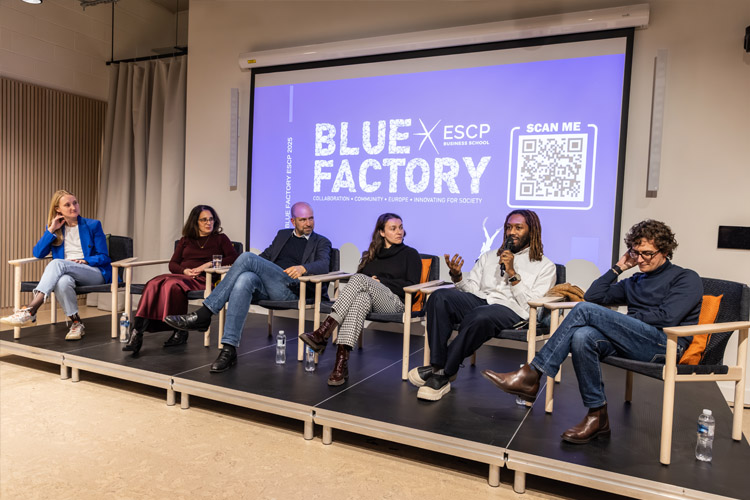
Panel Members
We would like to extend a big thank you to the excellent panel speakers:
- Andreas Cser – Partner, Lead Co-Investments at Fraser; ESCP alumnus
- Marla Shapiro – Managing Partner, HERmesa
- Akil Benjamin – Managing Director, DOES
- Gian Maria Gramondi – Co-Founder, Shop Circle; ESCP alumnus
- Alice Ivanoff-Boardman – Co-Founder & CEO, Kokoon; ESCP alumna
The discussion was expertly moderated by Dr Alisa Sydow, Associate Professor of Entrepreneurship at ESCP London Campus and Academic Director of the MSc in Digital Transformation Management & Leadership.
It was a pleasure to host and organise this year's Entrepreneurship Festival through the London Blue Factory, bringing together our London network and external partners. In a startup ecosystem where people rarely connect across communities, this event proved once again that networking remains one of the most powerful drivers of opportunity and growth.
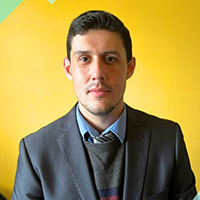 Harry McDonough
Harry McDonoughSenior Manager of Blue Factory London at ESCP Business School
Genius Circle Session
Following the panel discussion, the event concluded with a Genius Circle, an “entrepreneurship therapy” session, where founders present their ideas and pose questions to the audience to receive feedback and recommendations for immediate challenges. The hands-on nature of the session was a perfect continuation of the panel’s lessons, demonstrating how feedback and collaboration help founders learn and make decisions more efficiently.
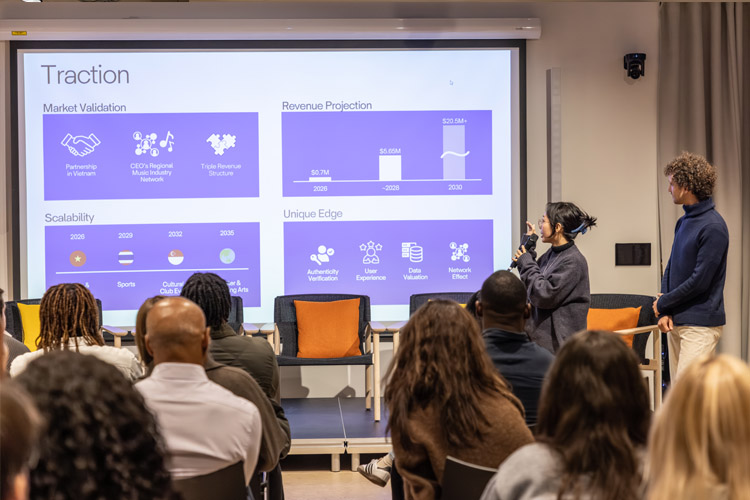
Two teams of MSc in Digital Transformation Management & Leadership students volunteered to take the stage. They presented Encore, a verified ticket-resale platform for the Southeast Asian market, and Winox, a digital solution for verifying the authenticity of vintage collector wines, and received valuable feedback to take away and apply to their ventures.
The 2025 London edition of the ESCP Entrepreneurship Festival clearly showed that entrepreneurship is not easy, but with the right mindset, team, and support tools, progress can happen quickly. And that is the real reality check.
View photos from the event
Campuses
